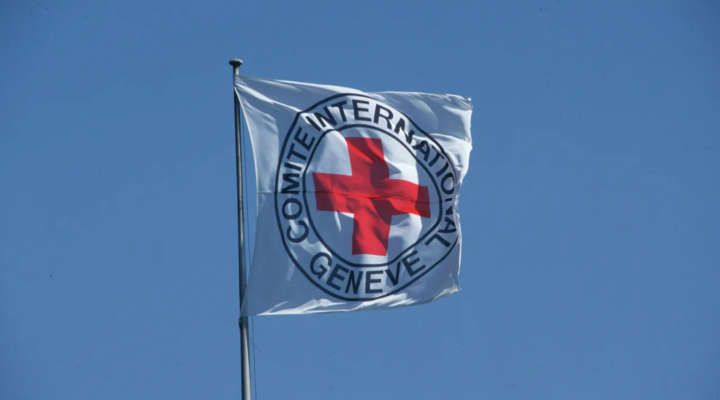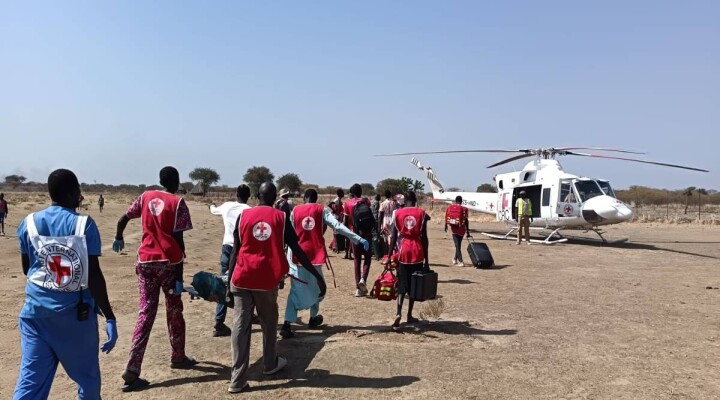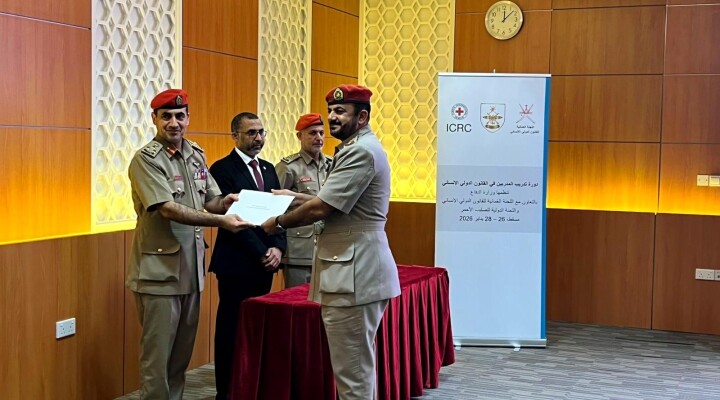Health-care in danger: Blaise Matuidi teams up with the ICRC to protect health-care workers in conflict zones
Geneva (ICRC) – In an ideal world, health-care workers who risk their lives to save others would have just as many supporters as footballers. Unfortunately, that’s far from the reality. The International Committee of the Red Cross (ICRC) counted no less than 3,780 attacks on health-care workers and facilities between 2016 and 2020, in an average of 33 countries each of those years. In response, the ICRC, Blaise Matuidi and the ad agency Saatchi & Saatchi are today launching a campaign to raise awareness of the essential role of health-care workers and the need to protect them.
One reason Mr Matuidi signed on to the campaign was because the Democratic Republic of the Congo, a country dear to his heart, was one of the places with the highest number of incidents. “It’s horrible that the people who take care of us are victims of violence, in the DRC and elsewhere,” he said. “Surgeons, hospital porters, nurses – they should all have the same popular support as us footballers.”
The ICRC speaks out regularly about this violence and is hoping that the backing from Mr Matuidi and Saatchi & Saatchi will galvanize public support. "Current efforts to protect health-care staff and facilities are not enough. We need concrete action: stronger laws that are properly implemented, secure health-care facilities and appropriate training," said Maciej Polkowski, head of the ICRC’s Health Care in Danger initiative.
Thanks to the support of Mr Matuidi and the agency, a short film has been produced that depicts an imaginary world where people cheer for a surgical operation with as much enthusiasm as football supporters in the real world. "It has you follow the operation like you would a big match, from the warmup to the trophy ceremony, with the surgeon as the footballer. The role reversal, heightened by the appearance of Mr Matuidi at the end, raises people’s awareness of the difference in treatment between footballers and health-care workers," explained Stépane Barbato, the film’s director.
Protecting health workers, in close cooperation with the local health authorities, is part and parcel of the ICRC’s work. For example, the ICRC works with hospital administrators on programmes to reduce the number of weapons entering emergency wards. Five months into one such programme, in a country in South Asia, the number of weapons intercepted increased from two to 42 per month. As a result, the hospital is safer for patients and caregivers alike.
The campaign is being officially launched today, 19 May, on the social media channels of Blaise Matuidi, the ICRC and everyone who wants to recognize the exceptional work of health-care workers by ensuring that they are never again the targets of violence.
The video is already available to watch here, but it is under embargo until 19 May at 8am CET.
About the ICRC’s data on health-care attacks: The data concerning events affecting the delivery of health care was collected from January 2016 through December 2020 by ICRC teams in an average of 33 countries per year where the ICRC has an operational presence, meaning countries experiencing conflict or violence. The data is not meant to be exhaustive but rather representative of what the ICRC sees in locations where it works. Because such data collection is often quite challenging, the data is likely an undercount of the true number of attacks and cases of obstruction.
For further information, please contact:
Florian Seriex / fseriex@icrc.org +41 79 574 06 36
Follow the ICRC on facebook.com/icrc and twitter.com/icrc
SHOTLIST
Location: Various
Length: 10:57
Format: HD mp4
Cameraperson: Various
Producer: Christopher Nicholas
ICRC ref: 20210518-ICRC-Medics-Surgery
Filming date: Various
Copyright: ICRC access all
00:00 Surgeon, Michael Mwandri in the operating theatre of a hospital in Wau, South Sudan, 2017
01:09 Surgeon, Michael Mwandri doing ward rounds, visiting his patients in Wau, South Sudan, 2017
01:51 Patients arriving by air and being brought to Ganyliel Hospital, Ganyliel, South Sudan 2019
02:38 ICRC Nurse, Kieren Box, and the surgical team in the operating theatre of Ganyliel Hospital, Ganyliel, South Sudan 2019
03:00 Injured man being wheeled in to Medina Hospital at night, Mogadishu, Somalia, 2010
03:15 Dr Mohamed Yusuf, and surgical team examining the injured man, Medina Hospital, Mogadishu, Somalia, 2010
03:44 Medic walking through the hospital grounds past the “No weapons” sign, Gao Hospital, Mali, 2017
04:02 ICRC surgical team treating a patient in the operating theatre, Gao Hospital, Mali, 2017
04:26 Convoy arrives at airport, where helicopters are waiting to take the wounded to Sana'a for treatment, Sa’ada Airport, Yemen, 2013
05:27 Young boy undergoing surgery at Panzi Hospital, Bukavu, Democratic Republic of the Congo, 2012
05:57 Hamda, a Syrian woman who lost her leg in the fighting in Syria, having a physical rehabilitation session with Physiotherapist Halid Sultan, WTTC Hospital, Tripoli, Lebanon, 2015
06:24 Setting up the field hospital in Al Hol Camp, Al Hol Camp, Hassakeh Governorate, Syria, 2019
07:04 Omar having his wounds cleaned by a volunteer from the Syrian Arab Red Crescent, Al Hol Camp, Hassakeh Governorate, Syria, 2019
07:45 Weapon wounded man receiving treatment, Diffa Hospital, Niger, 2015
08:03 Exterior of a Yemen Mine Action Centre, and Anmar, a patient with a triple amputation being examined by a Physiotherapist, and learning to walk with his prosthesis, Yemen, 2019
08:31 Dr. Mahoud El-Ahrast showing an unexploded bomb inside the hospital compound, Zawiyah Hospital, West of Tripoli, Libya, 2011
08:49 Dr. Mahoud El-Ahrast showing ICRC delegates damage inside the hospital operating theatre ward after a bomb blast, Zawiyah Hospital, West of Tripoli, Libya, 2011
09:03 ARCHIVE Ambulance arriving at hospital with a wounded man, and no weapons sign on entrance wall, Mirwais Hospital, Kandahar,Afghanistan, 2009
09:20 ARCHIVE Quetta Hospital, Pakistan, 1988
10:00 ARCHIVE Surgeon and medical team operating on a wounded man in a hospital in the former state of Biafra, 1968
10:57 ENDS



